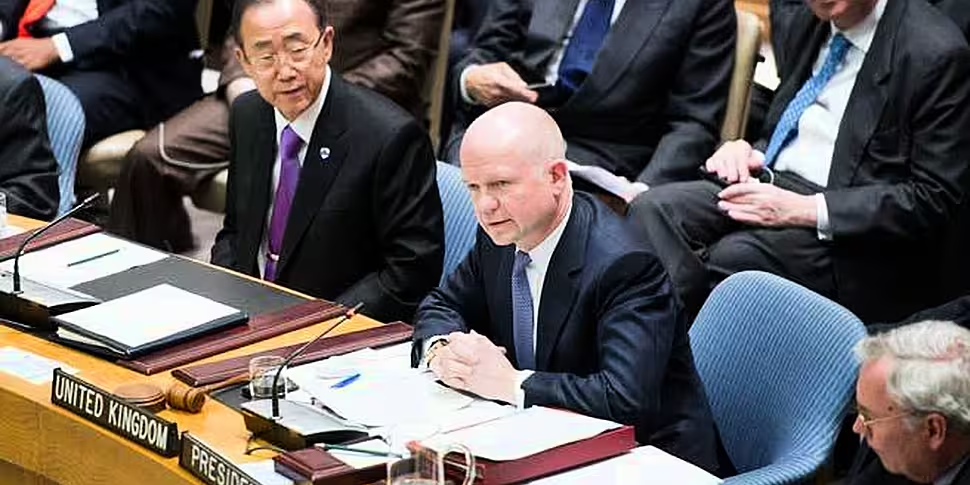The British Prime Minister David Cameron will decide tomorrow whether to recall the Parliament there to discuss the possibility of military action against Syria, Downing Street has said.
The announcement came after UN weapons inspectors investigating an alleged chemical attack in Damascus were shot at by snipers.
The team's lead vehicle was "deliberately shot at multiple times" as they left a government checkpoint during a visit to part of the city where hundreds of people were allegedly killed.
None of the inspectors, who were dressed in body armour, are believed to have been injured in the attack, which came after two mortar bombs landed close to their hotel.
UN spokesman Martin Nesirky said "The inspectors are determined to carry out the mission they are mandated to carry out. But it's obvious that all sides need to extend their co-operation so they can conduct this work safely."
Mr. Nesirky added it was not clear who was responsible for the sniper attack, although the Bashar al-Assad regime blamed the mortar fire on rebel fighters.

The team were "deliberately shot at multiple times", according to the UN
After the shooting the UN inspectors were able to change vehicles and meet victims of the alleged chemical attack, taking samples for testing before returning to their hotel in Damascus.
UN Secretary-General Ban Ki-Moon did not blame either side for the convoy attack but said he had told his disarmament chief Angela Kane to make a "strong complaint" to the Syrian government.
Speaking in South Korea, Mr. Ban said the team on the ground has been working around the clock to respond to the latest reports of alleged use of chemical weapons in Syria.
The team, led by Swedish scientist Dr. Åke Sellström, is spending up to 14 days, with a possible extension, probing the alleged use of chemical weapons by the Government at Khan al-Asal, as well as two other allegations reported by Member States.
The team is working in cooperation with the Organization for the Prohibition of Chemical Weapon (OPCW) and the UN World Health Organization (WHO).
The Assad regime said the inspections in Zamalka and Ein Tarma districts will prove allegations that chemical weapons were used against civilians, including children, were "lies". The opposition claimed 1,300 people were killed, while Doctors Without Borders said 355 people died in hospital from "neurotoxic" symptoms.
Mr. Ban said the people of Syria deserved to know the truth, adding "We cannot allow impunity in what appears to be a grave crime against humanity."
The international community continues to consider its response to the crisis, with the UK Foreign Secretary warning military action may be the only remaining option.
Hopes of a peace conference in Geneva appear to be receding, with sources in the Syrian opposition telling Reuters the talks are "off the table" after the alleged chemical attack.
Meanwhile, French politicians are preparing to meet "in the coming days" to decide whether to respond with force, according to the country's foreign minister Laurent Fabius.
There is mounting speculation that France, together with Britain and the US, could back limited airstrikes to demonstrate that deployment of chemical weapons will not be tolerated.

Inspectors arrived at the scene of the alleged attack after the shooting
The US says it will take only military action against Syria with agreement from the international community. U.S. Senator John McCain says his country must act.
"If the United States stands by and doesn't take serious action - not just launching some cruise missiles - then, again, our credibility in the world is diminished even more - if there's any left" he said.
However, Mr. Assad said military intervention by the US would fail.
"Failure awaits the United States as in all previous wars it has unleashed," the Syrian president said in an interview with Russian newspaper Izvestia.
Describing the chemical weapons accusations as "nonsense", Mr. Assad added "Would any state use chemical or any other weapons of mass destruction in a place where its own forces are concentrated? That would go against elementary logic. Accusations of this kind are entirely political and the reason for them is the government forces' series of victories over the terrorists."
Mr Assad received backing from two of his main allies, with Russia's Foreign Minister Sergei Lavrov warning that the use of force without a UN mandate would violate international law.
Meanwhile, Iran's Supreme Leader Ayatollah Ali Khamenei blamed countries outside the Middle East for the turmoil and said states in the region backing the Syrian opposition would be damaged by the conflict.
"The main reason behind the status quo in the region is interference from outside the region," the state news agency Fars quoted Khamenei as saying in a meeting with Oman's Sultan Qaboos.









